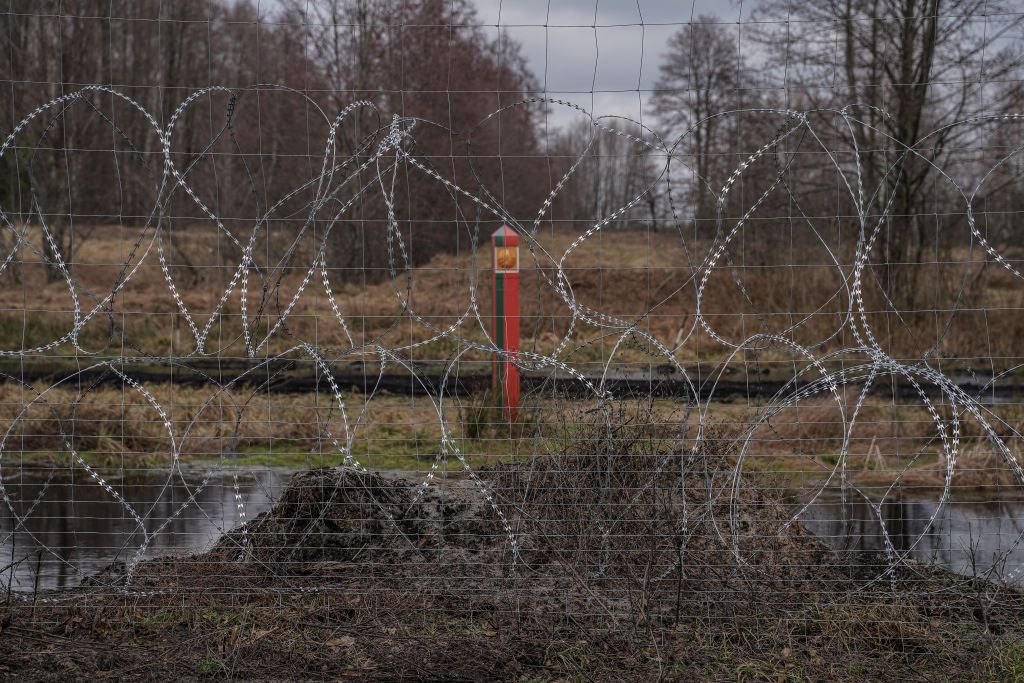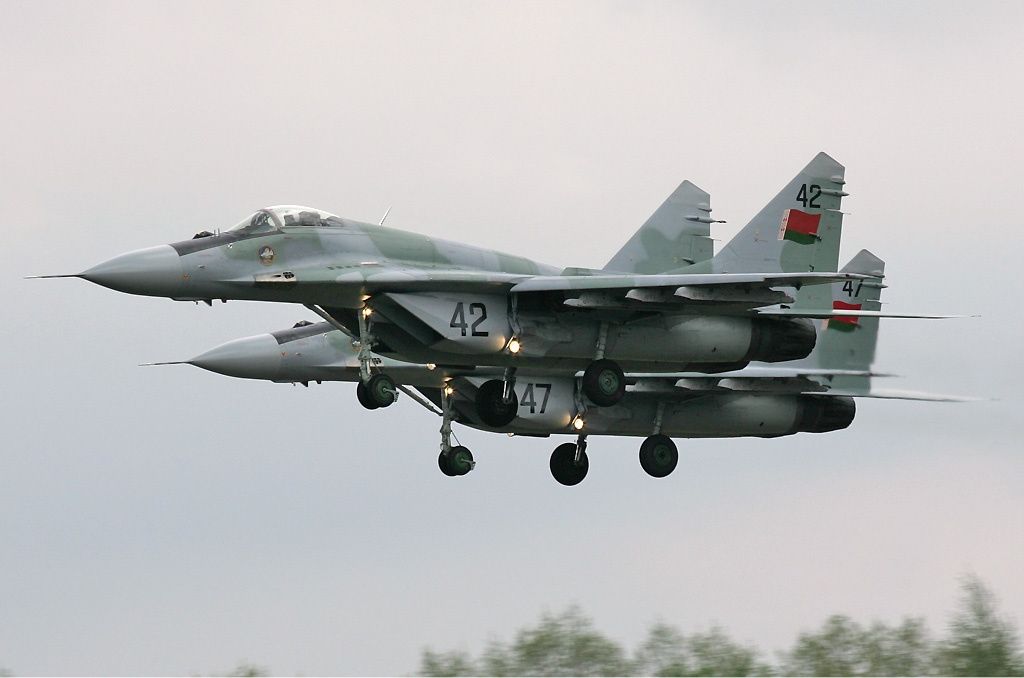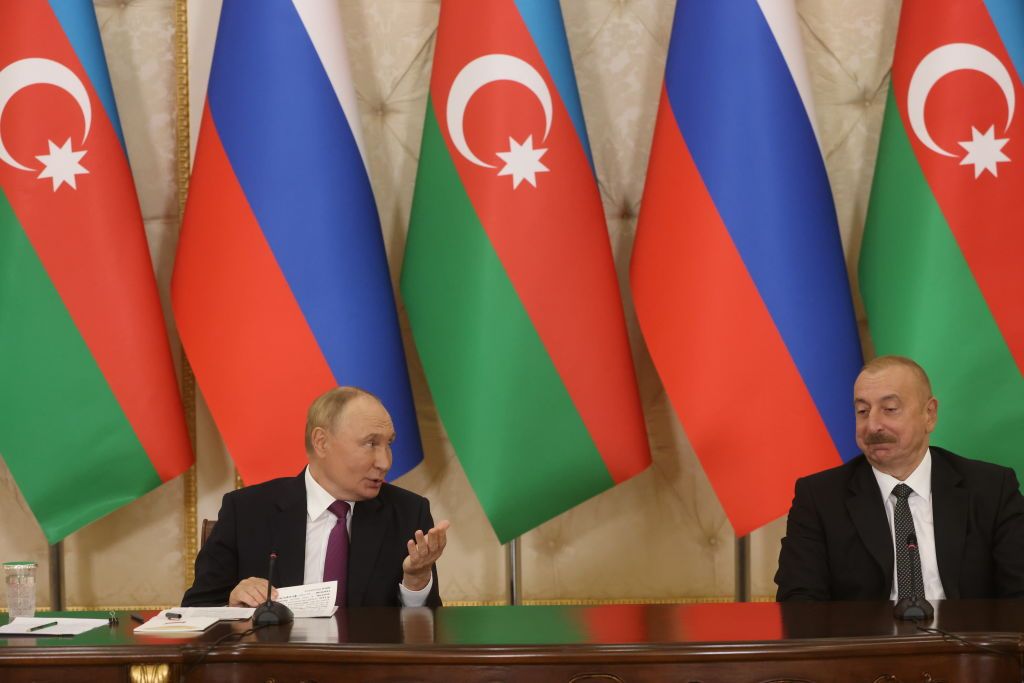Belarus Weekly: Kyiv, Minsk trade claims over intensified border tensions

Minsk rejects Kyiv's calls to remove troops from the border amid rising tensions between Ukraine and Belarus.
Russian drone incursions into Belarusian airspace becoming the norm: In the latest Russian attacks on Kyiv, at least three Shahed drones entered Belarusian airspace.
Belarus and China agreed to strengthen ties, signing free trade agreement during Chinese Premier Li Qiang's visit to Minsk.
EU acknowledges Belarus' release of some political prisoners, demands unconditional freedom for all detainees.
Belarusian dictator Alexander Lukashenko's remarks on Russian state TV trigger backlash in Armenia and Kazakhstan, heightening regional tensions.
Kyiv, Minsk trade claims over intensified border tensions
Kyiv has not officially requested Belarus to withdraw its troops from the border, the Belarusian Foreign Ministry has said amid more tensions between the two states.
Minsk’s statement came after the Ukrainian Foreign Ministry said on Aug. 25 that Belarus was “concentrating a significant number” of forces at the Belarus-Ukraine border.
The Ukrainian Foreign Ministry also said that former Wagner Group mercenaries were present at the border with Ukraine, and warned Belarusian officials against “committing tragic mistakes under Moscow’s pressure.”
Belarusian Foreign Ministry spokesperson Anatol Hlaz responded on Aug. 26, saying there had been no official requests from the Ukrainian side regarding troop withdrawals. Hlaz said the move might have been “some kind of cunning game, designed for internal consumption or to receive applause from the West.”
The Ukrainian Foreign Ministry said that Minsk was concentrating Special Operation Forces, as well as weaponry, including tanks, artillery, multiple-launch rocket systems (MLRS), air defense systems, and engineering equipment near Homel, a city in the south of the country, close to its border with Ukraine.

The open-source monitoring project Belarusian Hajun reported that Belarus transferred around 1,000 troops to its border with Ukraine after Belarusian dictator Alexander Lukashenko claimed his military had downed Ukrainian drones in Belarusian airspace. Belarusian Hajun instead linked the deployment to Ukraine’s ongoing incursion into Russia’s Kursk Oblast, where Kyiv’s forces claim to control around 1,200 square kilometers of Russian territory.
Ukrainian State Border Guard Service spokesman Andriy Demchenko, however, later said that the situation along the border remains unchanged.
“Ukraine’s defense forces are in full control of the border line, and no unusual situations have been reported along our state border,” Demchenko said on Ukraine’s national telethon.
In a rare move following the Wagner Group’s failed munity in June 2023, the mercenaries issued a statement on Telegram claiming that they no longer participate in the war in Ukraine, restricting their operations to Belarus and Africa.
The head of the Center for Countering Disinformation under the National Security and Defense Council of Ukraine, Andriy Kovalenko, said that 1,000 troops was insufficient to form a strike group capable of a full-fledged offensive from the territory of Belarus.
“All this information noise is directed at Russia because Lukashenko has to show Putin that he is doing something (for Russia’s war effort),” Kovalenko said.
Russian drone incursions in Belarus continue amid large-scale attacks on Ukraine
Several Russian Shahed attack drones went off course and entered Belarusian airspace during the latest massive Russian air attacks on Ukraine on Aug. 26-27, Ukrainian Air Force Commander Mykola Oleshchuk said.
He said three Russian drones flew into Belarusian airspace during Russia’s combined wave of attacks against Ukraine. Two Shaheds were spotted entering Belarusian airspace on Aug. 26, and another one on Aug. 27, Oleshchuk said.
Meanwhile, the Belarusian Hajun open-source monitoring project reported there had been up to six airspace incursions by Russian attack drones on Aug. 27.
Belarusian officials have yet to comment or make any protest to the Kremlin about the incidents. Lukashenko himself said on Aug. 10 that Belarusian forces had downed several allegedly “Ukrainian" aerial targets. The drones were reportedly detected at least 85 kilometers north of the Ukrainian border.
Belarusian Hajun branded Lukashenko’s statement as “nonsense.”
Chinese Premier visits Minsk, signs Free Trade deal, other agreements on security, energy
Belarus and China have agreed to develop ties in a range of sectors, including security, energy, logistics and finance, according to a joint statement released Aug. 23 following Chinese Premier Li Qiang’s official visit to Minsk.
Upon completing his first state visit to Russia as China's premier, Li arrived in Minsk on Aug. 22 to meet with Lukashenko and Prime Minister Raman Halouchanka.
The sides signed an Agreement on Service Trade and Investment, creating a free trade zone. Lukashenko said the deal would help increase Belarusian exports to China by 12% and boost Chinese investments in Belarus by 30%. His press office reported that about 15 Chinese investment projects worth up to $3 billion are in development.
According to the Chinese state-controlled China Daily newspaper, China’s trade with Belarus was over $8.4 billion in 2023, making China Belarus’ second-largest trade partner after Russia.
The statement also mentions strengthening China-Europe rail sector cooperation and further development of the Belt and Road initiative, China’s infrastructure and logistics mega-project spanning 150 countries, also known as the New Silk Road. As part of China’s Belt and Road initiative, Belarus was once described as the overland corridor between Asia and Europe.
However, with the migration crisis on the Polish-Belarusian border worsening, Poland has now left open only one border crossing for cargo, one for civil transit, and one railroad checkpoint for use as part of the Chinese initiative.
Then, with Poland considering a full shutdown of its border with Belarus, Polish President Andrzej Duda, during his visit to Beijing on June 24, raised the migration crisis issue and the corresponding cross-border traffic problems with Chinese leader Xi Jinping. Following Duda’s visit, Chinese Foreign Ministry spokeswoman Mao Ning expressed China’s hopes that “the sides will solve the problem on a consultative basis."
Minsk has recently been seeking to strengthen its ties with China. Belarus on July 4 joined the Shanghai Cooperation Organization, a Eurasian political, economic and defense organization led by Russia and China.
Shortly thereafter, the Chinese and Belarusian militaries on July 8 conducted joint military drills at the Brestskiy training range next to the border with Ukraine and Poland.
Although China officially maintains a neutral stance on Russia's full-scale war in Ukraine and denies providing lethal aid to Moscow, Beijing and Moscow are also continuing to strengthen their ties.
EU ‘takes note’ of release of some Belarusian political prisoners, urges unconditional release of all
The European Union has “taken note” of the release of political prisoners in Belarus who were jailed for taking part in peaceful protests after the fraudulent 2020 presidential elections in Belarus, EU spokesman Peter Stano said in a statement posted on Aug. 22.
"We share the relief and joy of the released individuals and their families,” the statement reads.
While noting that some of the released prisoners require “urgent medical assistance,” the EU urged Belarus to “immediately and unconditionally release all political prisoners, often held in life-threatening conditions” and provide them with adequate medical care.
The press office of Lukashenko announced on Aug. 16 that he had pardoned 30 people convicted of “protest offenses.” There are reckoned to be over 1,300 political prisoners in the country of about 9 million.
As of Aug. 26, human rights activists have confirmed the release of 21 prisoners, some of them suffering from severe health conditions.
The Viasna human rights organization reported the releases of the 74-year-old chairman of an independent trade union, Vasyl Berasneu, who was sentenced to nine years in prison and needed a kidney transplant, and cancer-sufferer Pavel Kuchynski, who was sentenced to five years of imprisonment despite being seriously ill.
Belarusian state-controlled television revealed the names of eight of the released prisoners in two rounds of interviews. They included former journalist Kseniya Lutskina, who developed a brain tumor while in detention.
Human rights organizations say they are maintaining “information silence” regarding the names of the other released prisoners, citing concerns for their safety.
Early in July, the Viasna Human Rights Center reported the release of 18 political prisoners, including Ryhor Kastusiou, the leader of the pro-democracy Belarusian Popular Front party, and Darya Losik, the wife of blogger and RFE/RL reporter Ihar Losik, who is also in prison.
A total of 39 political prisoners have been released since July 3, according to aggregated reports from human rights activists.
Simultaneously, in July alone, 63 more Belarusians were recognized as political prisoners by the human rights community. It was also reported that political prisoners in Belarusian penal colonies were being coerced into writing pleas for pardons.
Lukashenko’s comments in interview spark anger in Armenia, Kazakhstan
Belarusian dictator Alexander Lukashenko’s criticism of Armenia and Kazakhstan and other members of the Russia-led Collective Security Treaty Organization sparked protests in Yerevan and Astana on Aug. 21.
During an appearance on Russian state television, Lukashenko made derisive remarks regarding the Armenian pivot towards the West, saying, "Who needs Armenians? Nobody. Let them develop their economy and rely on their own resources. What is France? Who is (French President Emmanuel) Macron? Tomorrow, when Macron is gone, everybody will forget about the Armenians.”
France, which has a large Armenian diaspora, remains one of the country's strongest supporters.
Lukashenko also criticized other CSTO countries, including Kazakhstan, for “trying to take advantage of Russia while giving nothing in return.”
Referring to the violent protests in Kazakhstan in January 2022, which Russia and Belarus helped suppress at the request of Kazakhstan’s authorities, Lukashenko said that when “something happened in Kazakhstan,” Astana turned to Moscow and Minsk, not China, India, or Pakistan.
In response to Lukashenko’s comments, protesters in the Armenian capital Yerevan threw eggs and tomatoes at the Belarusian embassy, which Minsk later said it considered “an act of vandalism.”
The Armenian Consultative Platform of Democratic Forces, which unites several political parties, also demanded that the country's authorities “immediately sever diplomatic relations with Belarus until dictator Lukashenko is removed from office” and recommended inviting "Belarusian president-elect (and exiled opposition leader) Sviatlana Tsikhanouskaya” to visit Yerevan.
Belarusian opposition leader Sviatlana Tsikhanouskaya condemned Lukashenko’s comments, saying that Lukashenko had “betrayed both Belarusians and Armenians, acting on behalf of the Kremlin.”
On the same day, Kazakhstan’s Foreign Ministry summoned Belarusian ambassador Pavel Utsiupin, and called on Belarus to "objectively assess the position of Astana,” maintaining that “Kazakhstan pursues a balanced and peaceful foreign policy in accordance with the UN Charter and the fundamental norms of international law."
Astana did not officially disclose the reason for summoning the Belarusian ambassador.
Lukashenko's remarks have dealt another blow to the deteriorating relations between Armenia and Belarus. In June 2024, both countries recalled their ambassadors for consultations over Lukashenko’s vocal support for Armenia’s neighbor Azerbaijan, with which Armenia has been in conflict for decades.
While officially Armenia’s ally within the Russia-led Collective Security Treaty Organization (CSTO), Lukashenko expressed support for Azerbaijan in the 2023 Azerbaijani offensive in Nagorno-Karabakh and reportedly supplied advanced weapons to Armenia’s rival between 2018 and 2022, likely giving Baku the upper hand on the battlefield.
As a member of the CSTO, Belarus is obliged to defend a CSTO member state. Armenia called for CSTO assistance during Azerbaijan’s “operation,” but received no help from its allies, which resulted in Azerbaijan taking control of the Nagorno-Karabakh region in 2023.
Armenian Prime Minister Nikol Pashinyan has since said that no Armenian official, including himself, will visit Belarus as long as Lukashenko remains in power.














